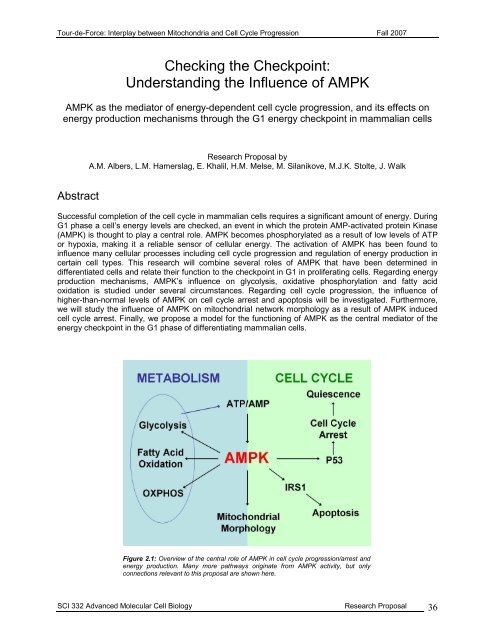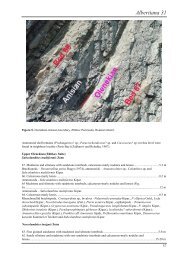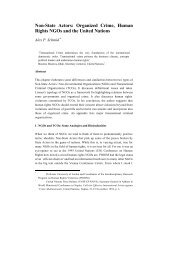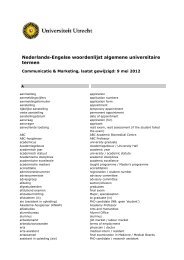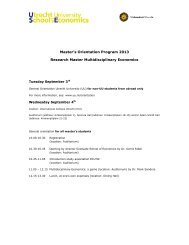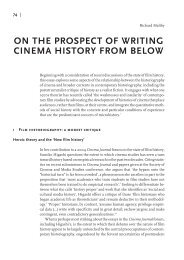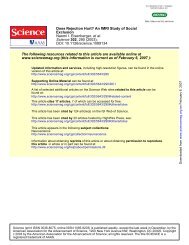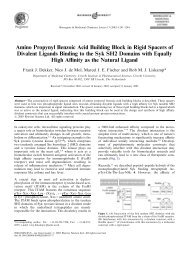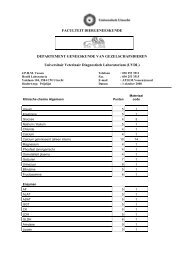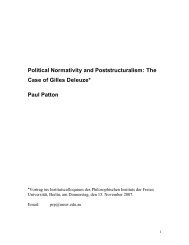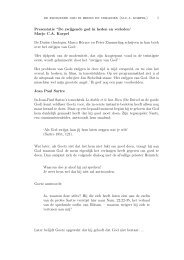<strong>Tour</strong>-<strong>de</strong>-<strong>Force</strong>: Interplay between Mitochondria and Cell Cycle Progression Fall 2007Checking the Checkpoint:Un<strong>de</strong>rstanding the Influence of AMPKAMPK as the mediator of energy-<strong>de</strong>pen<strong>de</strong>nt cell cycle progression, and its effects onenergy production mechanisms through the G1 energy checkpoint in mammalian cellsResearch Proposal byA.M. Albers, L.M. Hamerslag, E. Khalil, H.M. Melse, M. Silanikove, M.J.K. Stolte, J. WalkAbstractSuccessful completion of the cell cycle in mammalian cells requires a significant amount of energy. DuringG1 phase a cell’s energy levels are checked, an event in which the protein AMP-activated protein Kinase(AMPK) is thought to play a central role. AMPK becomes phosphorylated as a result of low levels of ATPor hypoxia, making it a reliable sensor of cellular energy. The activation of AMPK has been found toinfluence many cellular processes including cell cycle progression and regulation of energy production incertain cell types. This research will combine several roles of AMPK that have been <strong>de</strong>termined indifferentiated cells and relate their function to the checkpoint in G1 in proliferating cells. Regarding energyproduction mechanisms, AMPK’s influence on glycolysis, oxidative phosphorylation and fatty acidoxidation is studied un<strong>de</strong>r several circumstances. Regarding cell cycle progression, the influence ofhigher-than-normal levels of AMPK on cell cycle arrest and apoptosis will be investigated. Furthermore,we will study the influence of AMPK on mitochondrial network morphology as a result of AMPK inducedcell cycle arrest. Finally, we propose a mo<strong>de</strong>l for the functioning of AMPK as the central mediator of theenergy checkpoint in the G1 phase of differentiating mammalian cells.Figure 2.1: Overview of the central role of AMPK in cell cycle progression/arrest an<strong>de</strong>nergy production. Many more pathways originate from AMPK activity, but onlyconnections relevant to this proposal are shown here.SCI 332 Advanced Molecular Cell Biology Research Proposal 36
<strong>Tour</strong>-<strong>de</strong>-<strong>Force</strong>: Interplay between Mitochondria and Cell Cycle Progression Fall 2007IntroductionMammalian cells going through the cell cycle are thought to have an energy checkpoint in the G1-phase,which is hypothesized to check whether energy levels are sufficient to proceed to S-phase. AMP-activatedprotein kinase (AMPK) plays a central role in this checkpoint by measuring ATP availability through AMPlevels, since AMP levels increase as ATP levels drop. Activated AMPK is thought to have many effects inthe cell, the major ones of interest in our experiments being influences on cell cycle progression and arrestas well as energy production.Research goalThe goal of this research is to verify a proposed mo<strong>de</strong>l of AMPK function in proliferating mammalian cells.We theorize that AMPK plays a role in multiple processes within the cell. Firstly, higher-than-normal levelsof activated AMPK induce cell cycle arrest, in some cases followed by apoptosis; secondly, high AMPKlevels upregulate certain mechanisms involved in energy production (Figure 2.1). These two processesare linked in a logical inter<strong>de</strong>pen<strong>de</strong>nt manner. As soon as AMPK activation exceeds a “threshold value”because of abnormally low levels of ATP (or rather, high levels of AMP), the first consequence observed iscell cycle arrest. The energy supply is insufficient for the cell (probably insufficient to successfullycomplete DNA synthesis, a <strong>de</strong>manding energy consuming process for which high levels of ATP arenee<strong>de</strong>d). Therefore, instead of proceeding into S-phase, the cell cycle is halted in G1-phase.We theorize that at the same time, activated AMPK causes the upregulation of energy-producing,catabolic pathways, such as glycolysis and fatty acid oxidation. This seems a logical consequence, sincethe apparent cause of the AMPK activity is abnormally low levels of energy; hence, the cell is in need ofincreased energy production. AMPK influence on energy producing mechanisms has been shown indifferentiated cells (Dyck & Lopaschuk, 2006).Furthermore, we know that AMPK activity can cause apoptosis. In our mo<strong>de</strong>l, this is proposed as thecell's last resort: the energy level of the cell could not be restored sufficiently. Therefore, prolonged AMPKactivity, if unsuccessful in restoring normal energy levels leads to apoptosis. This research aims atconverging already established knowledge on AMPK and evaluating it in the context of the ongoing cellcycle and energy metabolism (see Figure 2.2).Figure 2.2: Proposed Mo<strong>de</strong>l for AMPK functioning in the cell. Wepropose a mo<strong>de</strong>l in which the three processes cell cycle arrest,energy-producing processes and apoptosis are linked in a logicalmannerRelated to AMPK’s regulation of cell cycle progression could be a potential effect of AMPK on themorphology of the mitochondrial network of a cell. Changes in the structure of the mitochondrial networkhave been postulated to be important in cell cycle progression, cell differentiation and apoptosis, as wellas energy producuction (McBri<strong>de</strong> et al., 2006; Margineantu et al., 2002; Alirol & Martinou, 2006; Arakaki etSCI 332 Advanced Molecular Cell Biology Research Proposal 37


